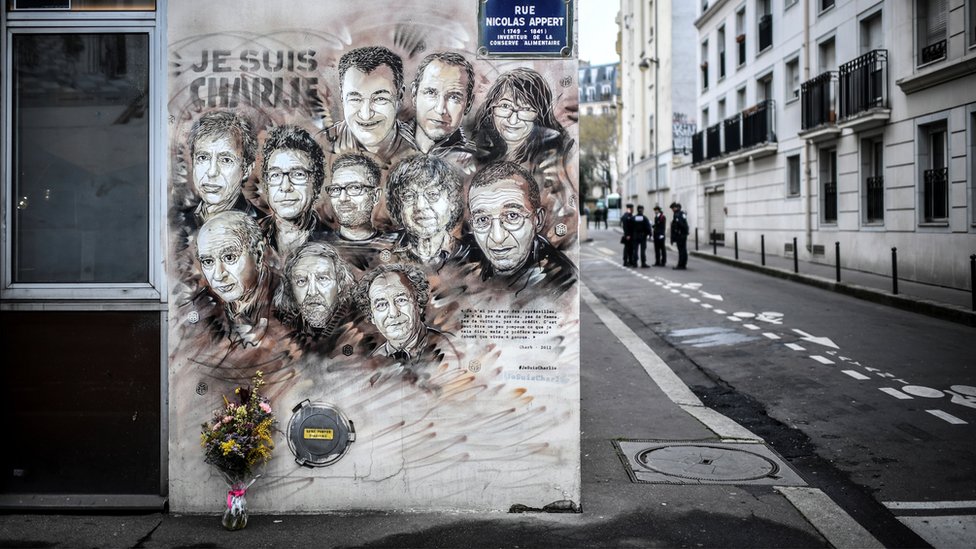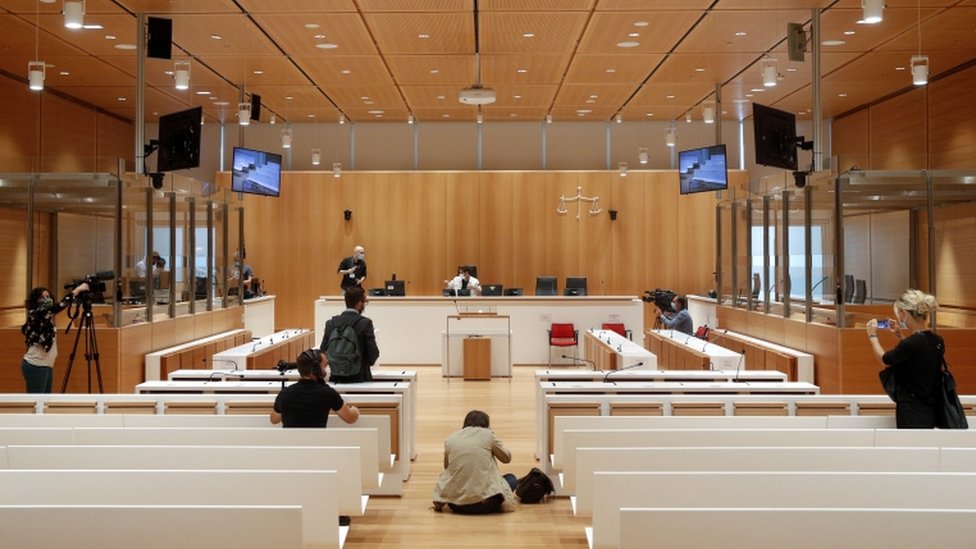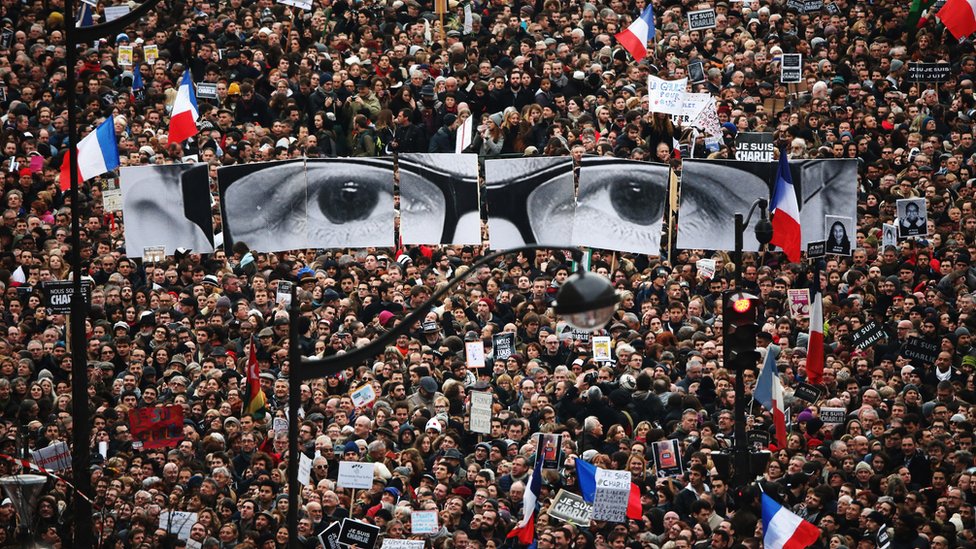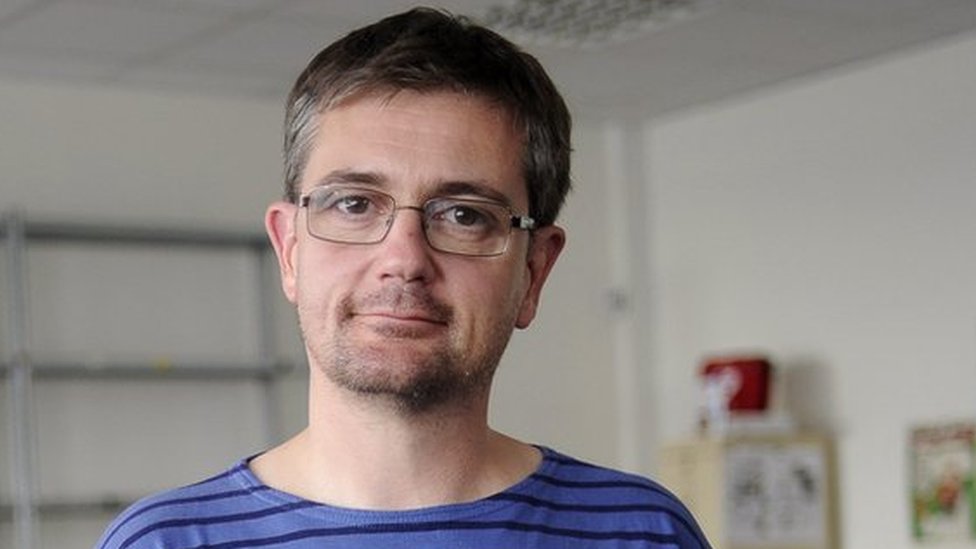 image copyrightGetty Images
image copyrightGetty ImagesFourteen people are to go on trial in France over the deadly attack on the satirical magazine Charlie Hebdo more than five years ago.
Most of the alleged accomplices will stand trial in Paris on Wednesday, but three will be tried in absentia.
They are accused of helping the militant Islamist attackers who shot dead 12 people in and around Charlie Hebdo’s offices in January 2015.
A third gunman shot dead a policewoman and attacked a Jewish supermarket.
In total, 17 people were killed in a period of just three days. The killings marked the beginning of a wave of jihadist attacks across France that left more than 250 people dead.
In the days following the attacks, millions of people took part in solidarity marches across France and around the world under the slogan “Je suis Charlie” (I am Charlie).
What’s expected at the trial?
Fourteen people stand accused of helping to prepare and plan the killings. Their trial starts on Wednesday after the proceedings were postponed for almost four months because of the coronavirus pandemic.
In March, the presiding judge said France’s lockdown measures had made it impossible to bring together “all the parties, witnesses and experts under the necessary sanitary conditions”.

The alleged accomplices are accused of obtaining weapons and providing logistical support for the attack on Charlie Hebdo’s office on 7 January 2015, as well as the subsequent attacks on a police officer and the Hyper Cacher supermarket.
But three suspects are believed to have disappeared in northern Syria and Iraq and will be tried in absentia. Some reports suggest the three men were later killed in bombing campaigns against the Islamic State group (IS), but this has not been confirmed.

There are about 200 plaintiffs in the trial and survivors of the attacks are expected to testify, France’s RFI broadcaster reports.
On Monday, the anti-terror prosecutor Jean-François Ricard dismissed the suggestion that it was just “little helpers” who were facing justice.
“It is about individuals who are involved in the logistics, the preparation of the events, who provided means of financing, operational material, weapons [and] a residence,” he told France Info radio. “All this is essential to the terrorist action.”
The trial is expected to last until November.
What happened in 2015?
On 7 January that year, two French Muslim gunmen stormed the Paris offices of Charlie Hebdo in the Rue Nicolas-Appert before opening fire on its staff.
The gunmen were eventually killed by security forces after a lengthy manhunt. Their victims were eight journalists, two police officers, a caretaker and a visitor.
In a related attack just days later, a jihadist gunman killed three customers and an employee in a hostage siege at the Hyper Cacher Jewish supermarket in Porte de Vincennes in the east of Paris.
He had earlier shot dead a policewoman in the city.
Security forces eventually stormed the supermarket before killing him and freeing the remaining hostages.
Why was Charlie Hebdo targeted?
The radical weekly magazine was well known for taking swipes at the establishment and religion and has long drawn controversy.
Cartoons of the Prophet Mohammed brought Charb death threats as well as 24-hour police protection prior to his death. There was also a petrol bomb attack on the magazine’s offices in 2011.
The publication has also been seen as a beacon for free speech, with many of its defenders using the hashtag #JeSuisCharlie to defend it.

Charb strongly defended the Prophet Mohammed cartoons as symbolic of freedom of speech. “I don’t blame Muslims for not laughing at our drawings,” he told the Associated Press in 2012. “I live under French law. I don’t live under Koranic law.”
It added: “To reproduce these cartoons in the week the trial begins over the January 2015 terrorist attacks seemed essential to us.”
Related Topics
Click Here to Visit Orignal Source of Article https://www.bbc.co.uk/news/world-europe-53975350


